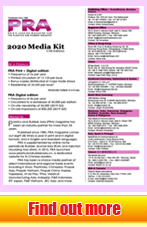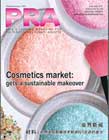PRA Chinese
Rubber Journal Asia Injection Moulding Asia Energy, Oil & Gas Asia
VISIT OUR OTHER SITES:
PRA Chinese
Rubber Journal Asia
Injection Moulding Asia
Energy, Oil & Gas Asia
US$106 mn Asian fund launched to curtail marine plastics

With a majority of marine plastics coming from Asia, a US$106 million fund dedicated to preventing plastics from entering the Asian oceans has been launched. Known as the Circulate Capital Ocean Fund (CCOF), it is said to be the world’s first investment fund dedicated to addressing Asia’s plastic crisis and has identified more than 200 investment potential opportunities, with the first investments targeted by early 2020. Created in collaboration with Closed Loop Partners and Ocean Conservancy, CCOF counts major brands as its founding investors such as PepsiCo, Procter & Gamble, Dow, Danone, Unilever, The Coca-Cola Company and Chevron Phillips Chemical Company.
Singapore-based and Monetary Authority of Singapore (MAS)-licensed venture capital fund management company CCOF, which is also one of the ten largest ASEAN-based Venture Capital Funds in the market, says to address the financing gap between available private capital and resources needed by Asia’s waste sector, it will provide both debt and equity financing to waste management, recycling, and circular economy start-ups and SMEs in South and Southeast Asia focused on preventing plastic pollution.
With 60% of ocean’s plastic originating from the region, Asia is the biggest source of plastic leakage into global oceans. A recent Ocean Conservancy Report identified a net financing gap between USD$28 and USD$40 per tonne for plastic waste collection in the five top ocean polluting countries in the world – China, Indonesia, Philippines, Thailand and Vietnam.
“The good news is that we are able to reduce nearly 50% of the world’s plastic leakage by investing in the waste and recycling sector in Asia, and even more if we invest in innovative materials and technologies. This is why we are here in Singapore – a strategic hub of Southeast Asia - to prove that investing in this sector is scalable for the region and can generate competitive returns, while moving closer to solving the ocean plastic crisis,” explains Rob Kaplan, CEO Circulate Capital.
The fund's launch comes at a time where the Singapore government has initiated recent green investment programmes. These include MAS’s recent commitment to US$2 billion of green investments directed at sustainable projects. The city state has also launched initiatives such as the Zero Waste Masterplan and a Resource Sustainability Bill as it aims to establish itself as the regional Circular Economy Centre of Excellence, driving green investment efforts around the region and the world.
CCOF says its investment model seeks to mobilise institutional investors by blending concessionary funds with investment capital. Its objective is to mitigate risk and demonstrate that investments in turning waste into value can ultimately provide attractive financial returns.
"For the beverage sector, the more recycled content used in any type of packaging such as 100% recyclable plastics, the lower the carbon footprint. That’s why at Coca-Cola we have invested in Circulate Capital and have committed to collect and recycle the equivalent of every bottle or can we produce by 2030. Beverage packaging does not need to become waste. By investing in the waste collection and recycling sector in this critical region, it can become a valuable material used again and again - a step closer towards a circular economy,” said Matt Echols, Vice President, Communications, Public Affairs and Sustainability Coca-Cola Asia Pacific.
“Circulate Capital plays a critical role in solving the issue of plastic waste in our environment,” said Bambang Candra, APAC Vice President Dow Packaging & Specialty Plastics. “Supporting companies and infrastructure that are addressing plastic waste will catalyze the development of systems designed to advance a circular economy for plastics.”
Financing alone cannot solve the ocean plastic crisis. It requires a full suite of solutions from policy and corporate commitments to financial incentives and changes in consumer behaviour. Many of the actions needed will have to be taken at a local level.
To address these conditions, CCOF has partnered with a number of non-profit organisations, including Ocean Conservancy, Partnerships in Environmental Management for the Seas of East Asia (PEMSEA), and The Circulate Initiative (TCI), a non-profit organisation launched in October 2019 dedicated to ending ocean plastic pollution and building thriving, inclusive economies.
(PRA)
Subscribe to Get the Latest Updates from PRA Please click here
©2019 Plastics and Rubber Asia. All rights reserved.

©2019 Plastics and Rubber Asia. All rights reserved.
Home Terms & Conditions Privacy Policy Webmail Site Map About Us










































































